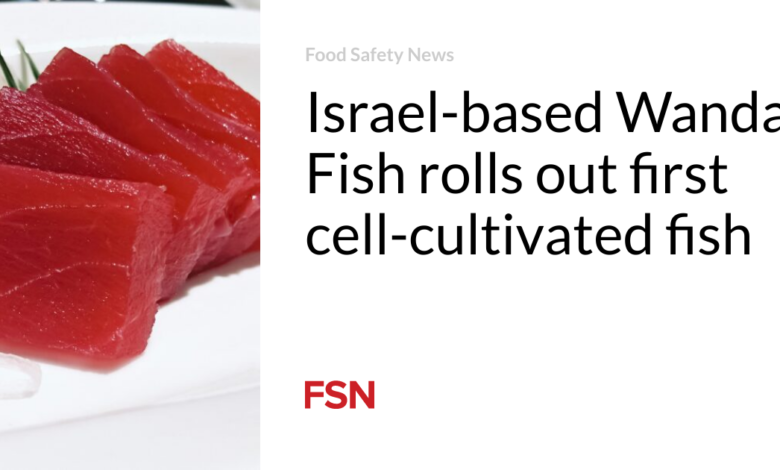Israel-based Wanda Fish rolls out first cell-cultivated fish

The U.S. and EU bans on food cultivated from cells will not likely slow that industry. The latest to weigh in is Israel-based Wanda Fish Ltd., out with its first cultivated bluefin tuna toro sashimi.
It is said to create the buttery sensation of a true Bluefin Toro. The cultivated sashimi will fulfill the burgeoning demand for bluefin tuna with a pollution-free, quality-consistent, and sustainable supply of the highly sought-after fish.
According to Wanda Fish, the raw toro specialty is from the fish’s underbelly, which has the highest fat content and high omega-3 levels. This is intended to provide a unique buttery sensation, making it the fish’s most tender and desired meat.
Wanda Fish’s cell-cultivated sashimi is also said to possess the same sensory features of the wild-sourced toro sashimi. It is imbued with comparable nutritional richness, especially protein and omega-3 fatty acids.
Science and investment capital seem to be driving Wanda Fish.
The company, closely associated with David Kaplan, Ph.D., a world-leading academic authority on cellular agriculture, was founded in 2021 and has attracted $10 million in investment capital. Its relationship with Kaplan comes through an exclusive agreement with Tufts University in Boston.
Last year, it announced its capital “seed round” of $7.1 million, with AquaSpark leading the round and joined by additional investors Strauss Group’s The Kitchen Hub (the incubator nurturing Wanda Fish’s operations), Peregrine Ventures, PICO Venture Partners, MOREVC, and CPT Capital Ventures.
This support has made Wanda Fish a cutting-edge company spearheading a more sustainable future for ocean seafood. Through so-called “disruptive” technologies, they produce a variety of whole-cut cultivated premium fish filets outside of the ocean.
The company has a highly skilled multidisciplinary team: Daphna Heffetz, Ph.D., co-founder, and CEO, has more than 20 years of experience establishing and growing biotechnology companies. Malkiel Cohen, Ph.D., vice president of R&D, is an expert in stem cell technology and genomic engineering. Yaron Sfadyah, LLB, vice president of Business Development, brings more than a decade of global marketing and business development experience.
Maarten Geraets has joined Wanda as a member of the commercial advisory board. He brings decades of food experience to Nestlé SA and, most recently, to Thai Union PLC, where he has led its alternative protein business.
Wanda Fish’s cell-cultivated adaptation of the 3D filet reportedly combines the cellular mass of muscle and fat created from the Bluefin tuna’s cells, developed together with a plant-based matrix. The company hired skilled chefs to bring its sashimi to culinary perfection.
Wanda Fish’s patent-pending technology to induce native fat formation in bluefin tuna cells and a whole-cut downstream manufacturing process employs a rapid, low-cost, and readily scalable production method.
Daphna Heffetz, PhD, co-founder and CEO of Wanda Fish, says a key to the product is the same level of fat marbling as real Bluefin toro sashimi to create the same look and mouthfeel. He says this adds to the company’s ability to bring a whole-cut bluefin tuna toro filet to market without harming the ocean or diminishing the wild fish population.
It is not easy to catch. Bluefin tuna are the top tuna species and a prized marine delicacy.
Yaron Sfadyah, vice president of Business Development & Marketing for Wanda Fish, says cultivated bluefin tuna is one of those rare food products that makes good business sense because It is in high demand, with limited alternatives that match the taste and texture of the wild fish.
As for where to begin, Wanda Fish says it will introduce its tuna in the high-end food service sector, focusing on Japanese cuisine, where sushi and sashimi are traditional features.
(To sign up for a free subscription to Food Safety News, click here.)



